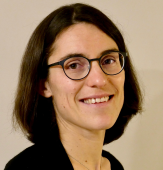|
|
|
Lectures and Keynotes > Day 1 - Introduction to Deformation in Robotics
Day 1 - Introduction to Deformation in Robotics10:00-11:00: Lecture: "Introduction to deformable robotics" - Kanty Rabenorosoa
Abstract: This lecture will introduce deformable robotics. The soft robots are made of deformable materials that have high numbers of degrees of freedom and potentially offer inherently safe and adaptable ways of achieving tasks as grasping, locomotion, and manipulation. A soft robot can homogeneously combine actuation, sensing, and structural complexity within the same component of the robot. From historical point of view, the different types of actuators will be presented and the principles of operation explained. Their integration on soft robots will be discussed and some examples of soft robots with exceptional capabilities will be detailed. A guide for the choice of actuators according to the size and performances of the soft robot will be presented.  Bio: Kanty Rabenorosoa received an M.S. degree in electrical engineering from the Institut National des Sciences Appliquées Strasbourg, Strasbourg, France, in 2007, and the Ph.D. degree in automatic control from the University of Franche-Comté, Besançon, France, in 2010. From 2011 to 2012, he was a Postdoctoral Fellow with Laboratoire d’Informatique, de Robotique et de Micro-électronique de Montpellier, University of Montpellier, Montpellier, France. He was an Associate Professor at ENSMM-SUPMICROTECH from 2012 to 2023. He is currently a full Professor (section 61) at University of Franche-Comté with the Automatic Control and Micro-Mechatronic Systems (AS2M) department of FEMTO-ST Institute. His research interests include mechatronics, smart actuator, origami-based robots, soft and continuum microrobotics for medical applications.
11:30-12:30: Keynote "Deformable worlds or deformable robots: historical evolution of robotics applications" - Maud MarchalAbstract: This course will retrace an historical evolution of the influence of deformations on the design of robots and their environments.  Bio: Maud Marchal is a Full Professor in Computer Science at INSA Rennes and IRISA research unit. She is also a Junior Member of Institut Universitaire de France since 2018. She works on physics-based simulation since her PhD in 2006 at University Joseph Fourier, Grenoble. Since 2008 and her position at INSA, she has explored and contributed to novel Virtual Reality and robotics applications, gathering her expertise on haptic feedback, 3D interaction techniques and interactive physics-based simulations. She is involved in program committees of major conferences of computer graphics, virtual reality and haptics and Associate Editor of IEEE Transactions on Visualization and Computer Graphics, IEEE Transactions on Haptics, ACM Transactions on Applied Perception and Computers & Graphics. 13:30-14:30: Keynotes "Epistemological and socio-anthropological vision""Some theoretical challenges of deformable robotics." - Olivia ChevalierAbstract: If the theoretical framework (principles, models) of rigid robotics seems well defined, that of deformable robotics is not yet. However, it can only be done when the theoretical challenges specific to it are identified. By questioning the scientific literature and roboticists, we wish to determine some of these challenges from an epistemological angle. In this presentation, I will focus on two of them. The 1st is a methodological obstacle relating to design, fabrication and control, given that deformable robots integrate complex structures combining soft and hard, mechanical and organic. What are the avenues for a new methodological approach? What are the specific mathematical tools for its simulation and do we need them? For example, what about the extension of the notion of calculation within the framework of Physical ArtiJicial Intelligence (PAI) analyzed by Hauser, or Miriyev and Kovac? The 2nd challenge concerns applications. If we formulate the question in the economic terms of supply and demand, this challenge has two sides. On the supply side: for what types of applications is this deformable robotics suitable? On the demand side: conversely, what types of deformable robots should we design for a given application?  Bio: Olivia Chevalier est chargée de recherche en philosophie des sciences (Institut Mines-Telecom/Chaire Innovation Bloc Opératoire Augmenté et PEPR O2R). Ses recherches ont d’abord été consacrées à la rationalité́ scientifique à l’âge classique (chez Descartes, Leibniz) et sa pertinence contemporaine. Elles se prolongent aujourd’hui dans une réflexion sur les implications épistémologiques des nouvelles technologies en chirurgie (Chaire Innovation Bloc Opératoire Augmenté) et en robotique organique. Dernier ouvrage : Descartes et ses mathématiques, Garnier Classique, 2022.
"Deformable Robotics: a new machine imaginary?" - Gerard DubeyAbstract: Reconciling the mechanical and the biological, the machine and the living to overcome dualism is one of the ambitions of deformable robotics. The consequences resulting from this change of direction touch on the very foundations of our knowledge (Olivia) but also on the way in which we represent as humans in our relationship to the environment, as living beings in our relationship to the rest of the living. This implies renouncing the use of force (like previous industrial machines) but also undoubtedly the desire to control everything, to rely somewhere on the initiative of matter and living things. On the machine design side, the challenges are no less great. This implies an almost complete reversal of perspective since an increasing part of autonomy is left to what we do not produce and only know incompletely. Incompleteness, irregularity, asymmetry, instability, unpredictability, impermanence are no longer perceived only as obstacles and limits to be pushed back (as in constructivist approaches) but as allies, points support for a new understanding of phenomena. This shift in attention also has the corollary of giving up part of the security that the regular operation of the machines, their robustness and their predictability provided us with. It is about accepting to lose control in order to regain it differently, while dealing with the new risks that this entails.  Bio: Gérard Dubey est professeur de sociologie à Institut Mines-Telecom Business School. Il est membre de l’ED de l’UFR de philosophie de l’Université Paris 1, co-directeur de la revue Socio-anthropologie, chercheur au CETCOPRA-Paris (ER 2483). Ses recherches portent sur les transformations des modes de connaissance et d’action dans les environnements numériques de travail, notamment dans le domaine de l’aéronautique civile et militaire et dans le domaine de la santé (robotique personnelle et chirurgie. Dernier ouvrage : La servitude électrique (avec Alain Gras), Seuil, 2021.
|


